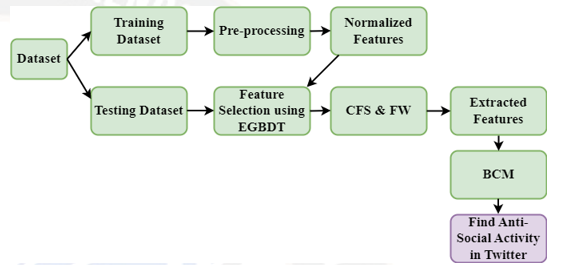Detecting the Anti-Social Activity on Twitter using EGBDT with BCM
Main Article Content
Abstract
The rise of social media and its consequences is a hot topic on research platforms. Twitter has drawn the attention of the research community in recent years due to various qualities it possesses. They include Twitter's open nature, which, unlike other platforms, allows visitors to see posts posted by Twitter users without having to register. In twitter the sentiment analysis of tweets are used for detecting the anti-social activity event which is one of the challenging tasks in existing works. There are many classification algorithms are used to detect the anti-social activities but they obtains less accuracy. The EGBDT (Enhanced Gradient-Boosted Decision Tree) is used to optimize the best features from the NSD dataset and it is given as input to BCM (Bayesian Certainty Method) for detecting the anti-social activities. In this work, tweets from NSD dataset are used for analyzing the sentiment polarity i.e. positive or negative. The efficiency of the proposed work is compared with SVM, KNN and C4.5. From this analysis the proposed EGBDT and BCM obtained better results than other techniques.
Article Details
References
Qixuan Hou, Meng Han, and Zhipeng Cai (2020), “Survey on Data Analysis in Social Media:A Practical Application Aspect”, Big Data Mining and Analytics, 3(4), pp259–279.
Mondher Bouazizi and Tomoaki Ohtsuki (2018), “Multi-Class Sentiment Analysis in Twitter: What If Classification Is Not the Answer”, IEEE access.
Koyel Chakraborty , Siddhartha Bhattacharyya , Senior Member, IEEE, and Rajib Bag (2020), “A Survey of Sentiment Analysis from Social Media Data”, IEEE Transactions on Computational Social Systems.
Balakrishnan, Vimala & Khan, Shahzaib & Arabnia, Hamid. (2020). Improving Cyberbullying Detection using Twitter Users’ Psychological Features and Machine Learning. Computers & Security. 90. 101710. 10.1016/j.cose.2019.101710.
Abinash Tripathy (2017), “Classification of Sentiment of Reviews using Supervised Machine Learning Techniques”, International Journal of Rough Sets and Data Analysis, 4 (1).
Ali Hasan , Sana Moin , Ahmad Karim and Shahaboddin Shamshirband (2018), “ Machine Learning-Based Sentiment Analysis for Twitter Accounts”, Math. Comput. Appl.
J. Rogstadius, M. Vukovic , C. A. Teixeira ,V. Kostakos ,E. Karapanos&J. A. Laredo (2013). Crisis Tracker: Crowd sourced social media curation for disaster awareness, IEEE. VOL. 57 NO. 5 PAPER 4.
Congyu Wu and Matthew S. Gerber (2017). Forecasting Civil Unrest Using Social Mediaand Protest Participation Theory. IEEE.
EimanKanjo, Daria J. Kuss, And Chee Siang Ang (2017).NotiMind: Utilizing Responses to Smart Phone Notifications as Affective Sensors. IEEE access.
Suman Deb Roy, GiladLotan, and Wenjun (Kevin) Zeng (2015).The Attention Automaton: Sensing Collective User Interests in Social Network Communities. IEEE, VOL. 2, NO. 1.
SudhaSubramani, Sandra Michalska, Hua Wang, Yanchun Zhang, And HaroonShakeel, Jiahua Du (2019). Deep Learning for Multi-Class Identification from Domestic Violence Online Posts. IEEE access.
SudhaSubramani , Hua Wang, HuyQuanVuand, and Gang Li (2018). Domestic Violence Crisis Identification from Facebook Posts Based on Deep Learning. IEEE access.
L. H. Son et al. (2019). Machine learning on big data: A developmental approach on societal applications in Big Data Processing Using Spark in Cloud. Springer.
Lev-On A. The Anti-Social Network? Framing Social Media in Wartime. Social Media + Society. July 2018. doi:10.1177/2056305118800311.
Neelakandan, S., & Paulraj, D. (2020). A gradient boosted decision tree-based sentiment classification of Twitter data. International Journal of Wavelets, Multiresolution and Information Processing, 18(04), 2050027. https://doi.org/10.1142/s0219691320500277

